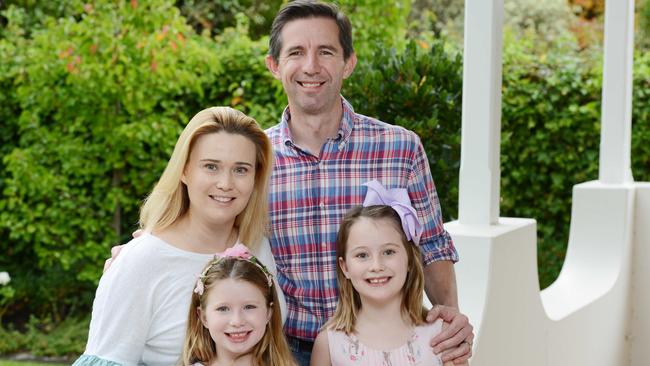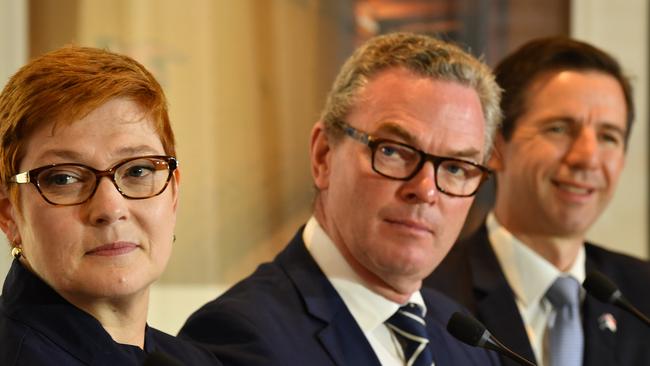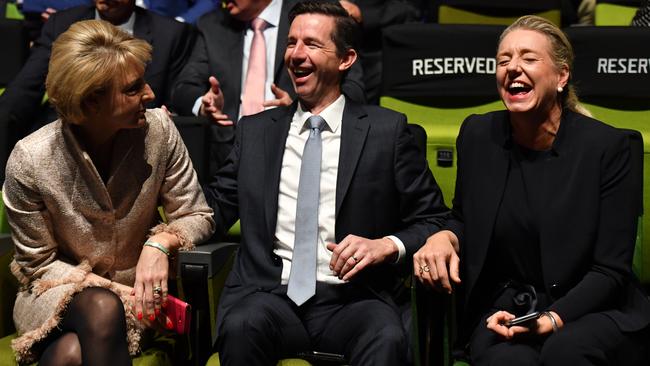How our SA pollies played a leading role in historic victory
Many thought the role of the Coalition campaign spokesman would be a poisoned chalice. But now, Senator Simon Birmingham will be remembered as one of the heroes of the campaign.
Federal Election
Don't miss out on the headlines from Federal Election. Followed categories will be added to My News.
- Scott is a great friend of SA, says Marshall
- Boothby set to play key role if Nicolle Flint turns lead into a win
- Sharkie reveals top priority in Canberra
- Buoyant Hanson-Young not SHY to shake it up
For five weeks South Australian senator Simon Birmingham had avoided a beer, which was symptomatic of the discipline he was forced to display, day-in, day-out, as the Liberals’ official campaign spokesman.
But that all changed late on Saturday night when Opposition Leader Bill Shorten conceded defeat, allowing Prime Minister Scott Morrison to claim a historic victory; one of the greatest achievements in Australian political history.
“I did raise a glass in response to the cheers in the room … and I knocked it back and enjoyed it,” Senator Birmingham said yesterday.
“It had been a very long campaign on the road and I had not had a beer for the entire campaign.”
Hardly as flamboyant as the outspoken – and outgoing – Christopher Pyne, many could have thought it a poisoned chalice to be given the role of spruiking the Coalition’s message amid a backdrop of looming defeat and dire polls.
But Senator Birmingham, alongside the PM and Treasurer Josh Frydenberg, will be remembered as one of the heroes of the campaign; although perhaps slightly unsung due to the higher profile of his colleagues. His messaging was clear, consistent, upbeat and direct: Don’t trust Labor’s high taxing agenda. Don’t trust Bill Shorten.
And it cut through.
But it was far from easy.
The Trade Minister’s task as campaign spokesman meant spending about seven out of 10 days away from his young family in Adelaide. A beer ban was primarily a symptom of the long days and nights selling the Liberals message, from early morning radio stints to late night TV appearances.

But just after 11pm, party faithful at Norwood’s Robin Hood hotel were ecstatic when Scott Morrison – during an unexpected victory speech – mentioned the South Australian’s name.
“Birmo”, as he is colloquially known, took a pint of Coopers Pale and did his best Bob Hawke impression.
The beer was symbolic because it heralded the end of a campaign that began almost 38 weeks earlier, immediately after Malcolm Turnbull was replaced by Mr Morrison as Prime Minister.
Then came Saturday night’s victory, driven by the Coalition winning where it needed to in Queensland, NSW and Tasmania.
“Scott, if he ever doubted it, he never showed it,” Senator Birmingham said yesterday, revealing that ScoMo always carried a “trusty notebook”.
The notebook included the bold plan he methodically carried out. Post Turnbull, the plan was simple: Bring the party back together; deliver the Federal Budget; and, sell the message of the Budget surplus.
“As a government it had taken us six years, but we had delivered on the things that people expected us to deliver on and were promised,” Senator Birmingham said.
The role of outgoing Defence Minister Christopher Pyne in the weekend’s result should also not be underestimated. He was the key numbers man in Mr Morrison’s unexpected rise to the prime ministership amid the Liberals’ leadership bloodbath in August last year.

Mr Pyne, who says he has no regrets about announcing his retirement in March, was instrumental in engineering Mr Morrison’s unlikely rise to the top, despite being deeply shocked and upset at the political assassination of former prime minister Mr Turnbull.
The-then Sturt MP, who retired at Saturday’s election, was part of Mr Turnbull’s inner sanctum, fighting last August to stave off a challenge from the Right’s Peter Dutton. When Mr Turnbull’s situation grew hopeless as resignation followed resignation, Mr Pyne became the emissary between him and Mr Morrison.
Essentially, the stop-Dutton campaign, spearheaded by Mr Pyne, transferred its support to Mr Morrison’s successful bid for the prime ministership.
Little more than six months later, Mr Pyne, speaking exclusively to The Advertiser, confirmed widespread speculation that he would retire, joining an exodus of senior ministers.
Even several party insiders believed Mr Pyne, who had been the Sturt MP since 1993, was quitting because he had given up any hope of a Coalition election victory.
But Mr Pyne rejected this at the time and again yesterday.
“Whether we won or lost the election didn’t figure in my thinking, because I’m retiring not because we were going to be in government or out of government,” he told The Advertiser. “I’m retiring because 26 years in politics is long enough and at 51 I felt that I could start a third career (after the law and politics) … (I have) absolutely no regrets. I’ve had a tremendous career. I’ve enjoyed it immensely. I’ve loved representing the people of the east and the northeastern suburbs.”

However, the impact of SA on the election does not end there. As of Sunday night, first-term Boothby MP Nicolle Flint – targeted by GetUp! as one of nine “hard-Right” Liberal MPs the pressure group campaigned to oust – was among five candidates who might deliver the crucial 76th seat needed for Mr Morrison to form majority government.
As the state’s most marginal seat, Boothby was the party’s substantial focus during the campaign, although resources were also allocated to Georgina Downer’s second unsuccessful bid to unseat Centre Alliance MP Rebekha Sharkie in Mayo. Having failed twice to win the seat held for 24 years by her father, former federal Liberal leader Alexander Downer, Ms Downer’s political career is uncertain at best.
However, Ms Flint, despite being on the brink of helping her party secure majority government, is already facing internal recriminations over her support for Mr Dutton at the leadership ballot.
Senior party figures argue Boothby voters sent a clear message that her right-wing ideology was inconsistent with a traditionally moderate seat.
They point out Mr Pyne’s replacement in Sturt, James Stevens, achieved a primary vote of 50.3 per cent, with a swing of almost six per cent in his favour.
In Boothby, the two-party preferred swing in Labor’s favour is about 2.4 per cent, with Labor candidate Nadia Clancy benefiting from a flow of former Central Alliance votes after the party failed to run a candidate in the seat.
There are even suggestions Ms Flint should nominate for the second Senate spot, after Senator Birmingham, at the next election and allow a centrist Liberal to contest Boothby. Even in the afterglow of the most stunning electoral comeback in modern Australian political history, the payback for the instability which almost crippled the party is simmering.
And as now the most senior Liberal in SA, Senator Birmingham may have to move from being the face of the Coalition’s campaign, to an internal elder statesman and peacemaker.



